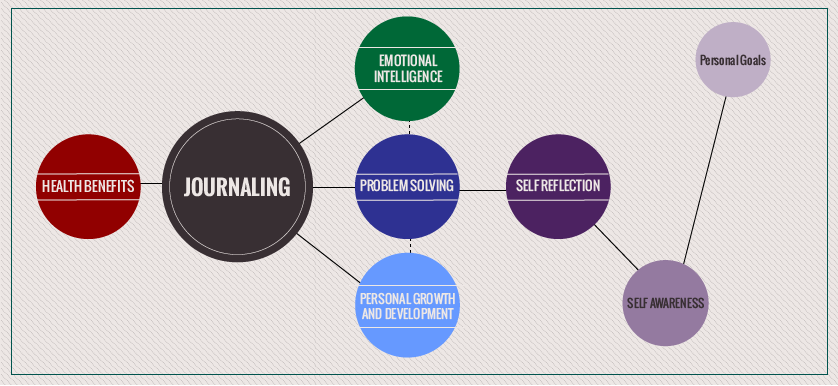Journaling: starting your practice successfully
Journaling is an easy daily practice which you can start today! It practically requires a low budged, close to zero, a dedicated time ranging from 5 minutes to 30 minutes and no previously required abilities. Nonetheless, the benefits it brings, from an emotional, mental, health and development point of view, are priceless.
In the first article published on this topic, Journaling your way towards personal success, you can find more details about the practice of journaling, such as:
- What is journaling?
- Why would you want to start journaling?
- What are the health benefits of journaling?
In this second article, also dedicated to the journaling series, I will detail how you can get started with this practice, by offering you a step-by-step process. This helps you if you are new to this area or if you have tried journaling in the past, but for one reason or another, you stopped and now you want to renew this practice.
In case you feel prepared to start your practice, I still recommend that you peruse the content of this article as it may give you new and interesting perspectives.
The step-by-step process of getting started with journaling
- Find the reason for starting this practice
As I mentioned in the previous article, it is very important to know why you would like to implement this habit. This way you ensure that it will be an enjoyable activity for you, and not perceive it as a task you impose on yourself. In the same time, you increase your chances of getting the most out of the entire experience.
In order to explore this part, you can take a few moments to answer several clarifying questions. Write down your answers on a paper so you can come back to them later on, when you might need an extra boost of motivation.
- What is the main purpose you have for starting writing in your journal?
- What is the need you want to address by starting a journaling practice?
- What problem can this practice solve for you?
- What are the results you want to see with implementing this habit?
- How do you plan to make use of writing daily on your chosen subjects?
- How do you want to feel while journaling?
- What do you want to experience through this practice?
- How does this practice fit with your current reality?
Once you have answers for these questions, you can always come back to them when you feel you are faltering in your practice, and rediscover the “WHY” behind your choice in the first hand.
In the meantime, if you have finished writing the answers for these questions, congratulations! You have already started journaling without even knowing it. I am convinced that it wasn’t even as difficult as you imagined it to be.
- Choose the type of journal that best fits you
Once you are really clear on your motivation for starting this practice, find the most suitable format and type of journal to suit your purpose. In order to do so, settle between:
- What are the trends or the topics that kept on surfacing while answering the questions from the previous point? This will surely give you an image on the type of the journal you are looking for.
- What is the silver lining of all your journaling entries? What is the common element which will connect all of them?
- Do you want to address a specific topic or you want to write in a stream of consciousness whatever comes to your mind?
- Do you want to create your own questions or journaling prompts or you want to answer predefined questions and prompts?
- Do you want to have a structure you follow each day or you want to have a totally different approach each time you write?
- Do you want to use only words or you are considering drawing, doodling or using mixed media?
In the next articles on this subject I will focus on the types of journals you can choose from, and offer examples of prompts to kick start your writing, so do not miss them.
- Settle on the best time of the day
Increase your chances of journaling each day by establishing the starting point and the duration you estimate for this practice. When you give your mind an estimation of time for each project, it is easier to grasp the needed effort and it will not sabotage you.
For example:
I start journaling each day at 09:00 and I write for 15 minutes.
If you are a morning person, and you prefer to set aside the “you time” at the start of your day, you can establish the starting time of this practice at early hours.
If you work better during the evening, and you want to relax after each day with documenting the experiences you had had, you can choose your starting point and include it in your evening routine. Nonetheless, do not put it 30 minutes before going to sleep, as your mind needs time to rewind and stop processing feelings, thoughts, and experiences before shutting down.
Morning time best fits for intentions and gratitude journals, while evening time best fits reviewing the day and taking out the main learning points.
It is really important to choose a time that best suits your purpose and your preferences, and estimate the duration so that you will have a clear structure to follow each day and not slide from this practice.
- Prepare your tools and space
First you have to decide whether you will be writing in cursive, or you prefer digital.
There are many studies advocating for choosing the pen and paper, since writing is activating a specific part of the brain – the reticular activating system (RAS), which is responsible for filtering and bringing into our sphere of attention the information we are handling and focusing on.
Maud Purcell, a journaling expert, states that “I find that most of my patients intuitively know that hand-writing their thoughts in a journal is more effective than composing them on a laptop.”
In the end, you should choose the environment with which you feel the most comfortable with. Give a try to cursive writing if you haven’t written by hand in a long time, but if it does not serve you, then opt for the most easy way for you, it should not be an obstacle of starting the practice.
Concerning the place, make sure that you find a location which is both quiet and private, meaning that you can write without being disturbed. If you work better with surrounding noise, and you can journal in a coffee place as well, just make sure you will feel at ease with people passing by your table.
Whatever style and location best fits your needs and purpose is the right one, and, in the end, it should be the needed facilitator for your writing experience.
- Identify what is holding you back from starting this practice
You might be just considering to start this practice, or you might have heard about journaling, think it is an interesting practice, but kept on postponing that moment in which you sit down and start writing.
Either way, it is necessary for you to identify what are the obstacles that stand in your way of writing. Most of the time, these obstacles that prevent you from not starting now, are your own limiting beliefs.
Here are some examples of limiting beliefs, and how to overcome them:
- I was never good at writing;
Journaling does not require special abilities in mastering words, nor does it imply creating a literature masterpiece. Journaling is a simple reflection of what you feel, how you think and what you are experiencing, expressed in written words. Do not spend time thinking how talented you are in writing, this is something that does not matter at all, when starting a journaling practice.
- Everything needs to be perfect before I start;
If you are a perfectionist, then you might be waiting for the perfect time, for the perfect mood, for the perfect pen, for the perfect paper, for the perfect everything. And even though all these can help your practice, do not get stuck in the process of finding them, make do with what you have at your disposal at that moment, and enhance the practice in time.
- I don’t want to open up old wounds;
It might be difficult to relive stressful moments, bad experiences, negative emotions, or painful events. But writing them down does not hurt more than keeping them inside of you and letting them grow even bigger than they are. If you are in such a situation, start writing and take a break when you feel you’re getting overwhelmed. Take a deep breath, calm down and continue with writing.
Find out what is stopping you from starting this wonderful practice. Ask yourself if these limiting beliefs are really true. Come up with solutions to deal with them, otherwise, you might find yourself postponing something which can bring you countless benefits.
This was the second article from the journaling series. In the next article I will develop on the different types of journals that you can start with and what they imply.
These being said, start your journaling practice today!
References:
Image sources:

Tags: Personal performance









